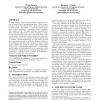Free Online Productivity Tools
i2Speak
i2Symbol
i2OCR
iTex2Img
iWeb2Print
iWeb2Shot
i2Type
iPdf2Split
iPdf2Merge
i2Bopomofo
i2Arabic
i2Style
i2Image
i2PDF
iLatex2Rtf
Sci2ools
ATAL
2007
Springer
2007
Springer
Reputation in the joint venture game
In many settings, agents need to identify competent partners to assist them in accomplishing tasks. Direct experience may not provide sufficient data to learn the competence of other agents. Reputation--a community-based assessment of agent competence--can augment direct experience, but is prone to error. This paper addresses the question of when reputation information is useful, examining a variety of multi-agent settings. It provides a systematic study of the way the utility of reputation varies by group size, group competency, level of error, and whether reputation information is available. Results demonstrate that the utility received from reputation increases as group size increases. However, the experiments also show that reputation is useful in small groups, during early rounds of a game series. These results also revealed a "pigeonholing phenomenon" in which highly capable agents are miscategorized by the reputation system as having low competence based on early sequ...
ATAL 2007 | Direct Experience | Intelligent Agents | Reputation Increases | Reputation Information |
| Added | 12 Aug 2010 |
| Updated | 12 Aug 2010 |
| Type | Conference |
| Year | 2007 |
| Where | ATAL |
| Authors | Philip Hendrix, Barbara J. Grosz |
Comments (0)

